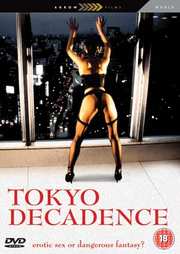Review of Tokyo Decadence
Introduction
1992`s `Tokyo Decadence` - also known as `Sex Dreams of Topaz` and the significantly less catchy `Topaz` - is a rare-ish foray into filmmaking for highly regarded Japanese author Ryu Murakami. Hardly a household name on these shores unless you`re a fan of Japanese fiction, his greatest claim to fame among Western audiences would be that his novel `Audition` was turned into the extraordinary romantic chiller of the same name by J-horror extremist Takashi Miike.
In a adaption of Murakami`s own novel, Miho Nikaido plays Ai, a submissive BDSM prostitute working among Tokyo`s wealthy business elite who juggles her nocturnal profession with pangs of hurt and obsession over splitting with her boyfriend, a married gallery owner and somewhat of a Japanese celebrity. There actually exists two versions of the film; cut and uncut. The cut version (released rather tardily in UK cinemas around 2001) was chopped up for pacing issues, while this full-length version from Arrow Films, running over 25-minutes longer, has been submitted to the BBFC for the first time and has escaped their clutches unscathed.

Video
Thanks to a wealth of flaws, this section becomes less of a review and more a game of how many technical issues can be squeezed into a paragraph. Presented in letterboxed 1.85:1, `Tokyo Decadence` is most notably very soft, fuzzy and distinctly low-res looking. There`s a spot of ghosting, especially around the beginning of the movie, the palette is distinctly washed out and the blacks are murky and lack depth - making it very hard to see exactly what`s going in some of the darker scenes. There`s also noticeable edge enhancement to artificially make the visuals appear sharper than they actually are.

Audio
The sole Dolby Digital 2.0 Japanese track (with optional English subtitles) sounds tinny and dull and the whole sound of the film lacks dynamism, both in terms of the technical limitations of the DVD and the weak score; a plinky-plonky, solitary electronic keyboard exercise. Worst of all though are the instances where the dialogue is inaudible. This doesn`t appear to be a case of DVD drop-out, instead sounding like an amateur soundhand, as if someone was pleasantly stroking the boom when they were supposed to be capturing speech between performers. There`s also occasions when dialogue is over-ridden by environmental noise - traffic, hustle and bustle and the like play their annoying part in some of the outdoor scenes.

Features
There was supposed to be a witty platitude here about tumbleweeds or some such to emphasise that there are no extras on this uber-budget disc, but gosh darn, someone left the back door open last night and it ran away.

Conclusion
There`s a reason why Stephen King doesn`t try his hand at direction and adapt his own novels into films. It`s probably not this, but I`m trying to make a point: the creativity in delivering a novel-based and a film-based narrative are worlds apart, ie, different vision, different pacing, different visual imagination. It would probably be hard to leave behind those processes used to create a novel when trying to deliver the same narrative for a film, and a such, one shouldn`t bother. Non-application of this very rule that`s just been pulled out of a reviewer`s rear would explain why Ryu Murakami`s films have never been much of a commercial success, and would certainly shed some light on why `Tokyo Decadence`, despite some highly interesting moments and powerful unspoken metaphors, is a bit of a meandering, befuddling plodfest. One of the big problems is that, despite its nature, the film isn`t nearly as brooding as the tale demands, with only the scenes opening the film and leading up to the conclusion efficient in this respect, but bookending a lot of fairly lighthearted material. There are also flourishes of amateurness in the editing - with premature cuts and mid-speech jumps - as well as the sound and the overused sets adding to the inexperient feel and the film seems to lack a sense of direction. Ryu Murakami is no Takashi Miike that`s for sure.
Sex is the agenda here. In fact, much of the film is, unsurprisingly, set during Ai`s sessions and the directorial approach walks a fine line between superficial titillation and emotional weight, but without ever seeming exploitative. In this respect, Murakami`s sexually-charged thriller is certainly classier than the erotic slabber that dribbles from the pen of smut virtuoso Joe Eszterhas and the like. However, the narrative is bogged down by overlong scenes, particularly in one of the first sessions in which we`re treated to observing Ai stripping down in front of an apartment window at the behest of a client who wants it done perfectly. Watching a pretty girl get rid of her underwear is great, and there is undoubtedly a point made in the repetitiveness of the scene about the nature of Ai`s professional life, but sooner or later as your eyes stray from the naked arse (yes, there is such a thing as too much arse) to the view of Tokyo out the window, you start begging for it to move on and reveal more of the story. This sense of walking through treacle continues throughout, to where scenes of Ai walking up and down that same apartment set as she visits clients feel like they could be a lot snappier, and if the whole film was paced more evenly it would greatly benefit. It`s no surprise they chopped almost a quarter of its running time off for the cinema release.
Yet despite this, there are some truly classic scenes that make the film worth watching despite its glaring flaws; this being in the sense that if the film were better known, they`d have been uploaded to YouTube long ago. Ai and her co-worker appearing to have accidentally killed an auto-asphyxiation fetishist in the throes of passion deserves to be included on any Channel 4 clipshow, and her experience with the gentleman whose idea of a good time is some after-dinner historical necrophilia roleplaying is bonkers in its absurdity. Add to this that Miho Nikaido`s central performance is not to be scoffed at, despite the fairly unengaging ex-lover arc, and you`ve got a film that`s worth considering spending a few hours investigating. The alien (to most) BDSM angle, despite seeming completely unrealistic, and the comic moments certainly give the film more mileage than the central narrative and often forgettable characters outside of the job, so it`s a bit of a trade off if you like. It`s certainly not the ignored classic certain elements (read: pretentious cinephiles) would have you believe, but the DVD could be worthy of your attention if you can ignore the fact that, in technical terms, the disc is a bit of a stinker; based on this disc, Arrow Films appear to be going out of their way to make Prism Leisure look like Criterion.
















































Your Opinions and Comments
Be the first to post a comment!